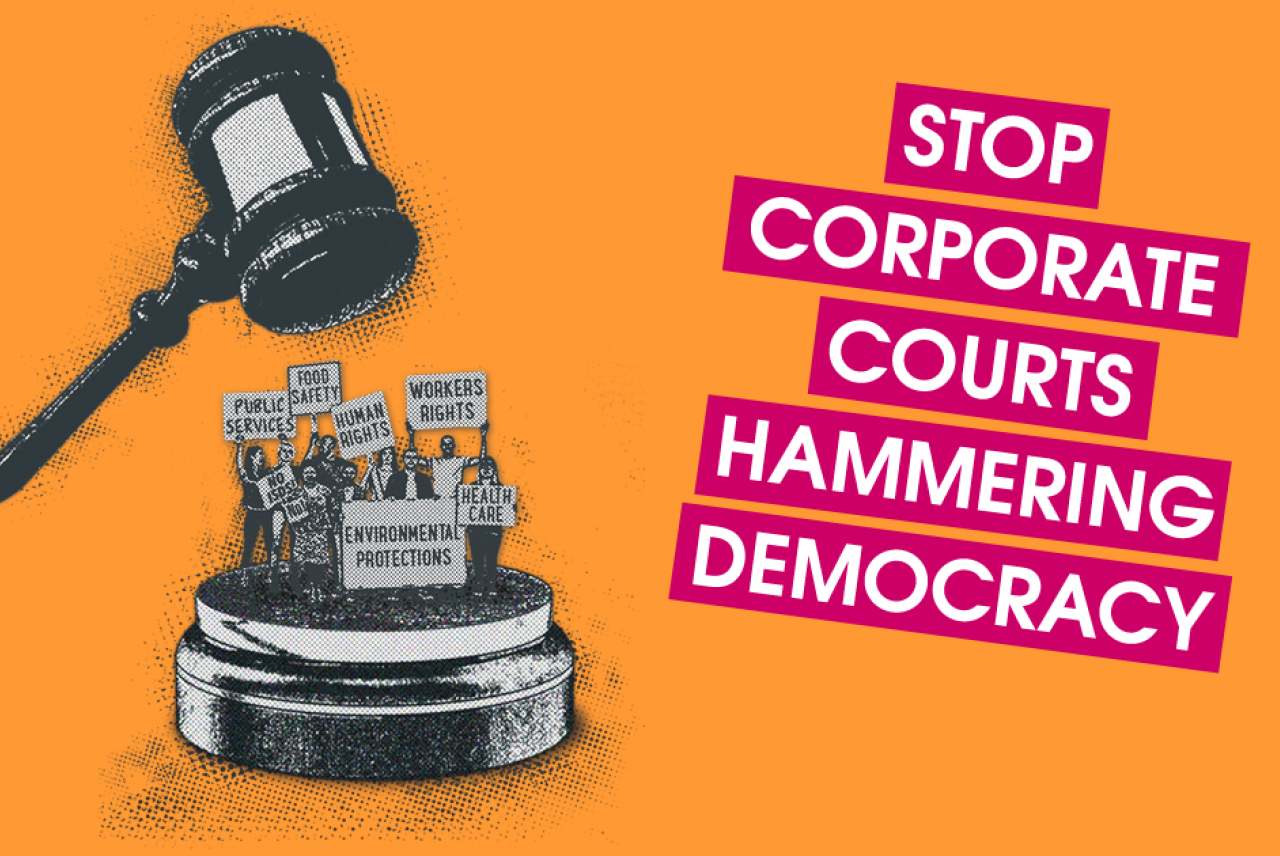The threat of litigation
Often the threat of a case alone can cause a government to retreat from policies that protect the public and the environment – in fear of being sued in corporate courts. The leaked trade papers reveal that the US like the 'chilling effect' that the threat of a case can have on a government considering policies that support the public interest:
"There is value in including ISDS in an investment chapter. The causality is not provable, but even if disputes do not proceed to claims, the presence of a backstop is invaluable in resolving things – including the possibility of Posts reminding a host state of their obligations."
And the US goes even further by rejecting moderate reforms of the corporate court system proposed by the EU (known as the Multilateral Investment Court, MIC) which would include more transparency into the process and guarantee the right for governments to appeal. US negotiators say that:
"adopting such an approach in a future UK-US FTA [Free Trade Agreement] is untenable with US preferences'"
In other words, the US is not just forcing the UK to include corporate courts in the trade deal but to adopt the most extreme version of corporate courts.
The US also warn that anything less than the most extreme, pro-business version of corporate courts would be a "high level concern’ for USTR [US Trade Representative] and Ambassador Lighthizer personally". And that if the UK were to support the reformed version in a UN forum, the trade deal might be off:
"The US continued to have severe concerns with respect to the EU’s proposals for a Multilateral Investment Court (MIC) and reiterated previous statements that the US Government would be very concerned at any indication that the UK was in favour of a MIC, they were clear that this would undermine the ability of the US to work with the UK in other forums...."
The inclusion of corporate courts in a US trade deal would threaten the ability of future UK governments to legislate and make policy decisions in the interests of the public and the environment.
It would have far-reaching implications on our ability to tackle the most pressing issues that we are facing such as dealing with the climate emergency or preventing the NHS from being further privatised. Ultimately, the system of corporate courts is a giant transfer of power into the hands of big business.
Big Tech and the digital economy
We also see this corporate power grab, through the demands of US big tech to write the rules for the digital economy in their interests and lock them in through trade deals. It’s an agenda to protect the global online platforms, like Amazon, Google and Facebook from regulation and allow them to maintain their global dominance.
How data is collected, shared, used, moved around and mined can have major implications on us all. Just this week, we’ve seen how the UK government has already allowed Amazon access to NHS data for free as well as selling NHS data to big pharmaceutical companies.
NHS data is a potential goldmine that can be used to create new medical devices, applications and treatments which are then sold back to the NHS at extortionate prices. And the Cambridge Analytica scandal where Facebook profiles were used to influence US voters demonstrated how the lack of regulation can seriously damage our democracy.
De-regulation a US priority
The US is keen to close down the regulatory space in the UK through a trade deal. And if successful, it would severely constrain future government action on an issue we are only just beginning to understand the wider implications of.
But this is a key priority area for the US and its negotiators have made clear in the leaked papers that they do not want major platforms such as Amazon, Google and Facebook liable for the behaviour of its users:
“The US has spent a long time looking at intermediary liabilities for platforms. This is a large part of the US economy, with many US companies relying on the ability to provide internet platform services on a large scale. US domestic law has provided these firms with immunity from liability for the behaviour of their user."
Yet these platforms are increasingly facing challenges around issues such as responsibility for false advertising (especially political advertising), sharing of child pornography, hate speech and online bullying.
Our societies are only beginning to work out how best to tackle this but a trade deal with Trump could prevent attempts to hold these immensely powerful platforms to account.
Trade deals unable to help with wider issues
Trade deals are not the right place to address the complex issues of digital regulation as the overriding goal of trade deals is to remove barriers to trade in order to increase trade and investment.
With this aim in mind, trade deals sideline and give no consideration to wider social issues such as child safety, hate crime, democracy or privacy. Powerful big tech companies have benefited hugely from a relative lag in digital regulation and taxation and are keen to use trade deals to lock-in the status quo and prevent future regulation from curbing their power.
The impacts of trade deals, especially one with President Trump, are so far-reaching that they cannot be negotiated in secret. But right now, the government can hold secret talks with other governments with no transparency and no accountability. And our MPs can only watch on as mere spectators as there are no parliamentary powers to mandate, scrutinise and vote on trade deals.
We need to keep calling for MPs to have the powers to provide democratic oversight and scrutiny as well as keep raising awareness about these wide-ranging threats.

